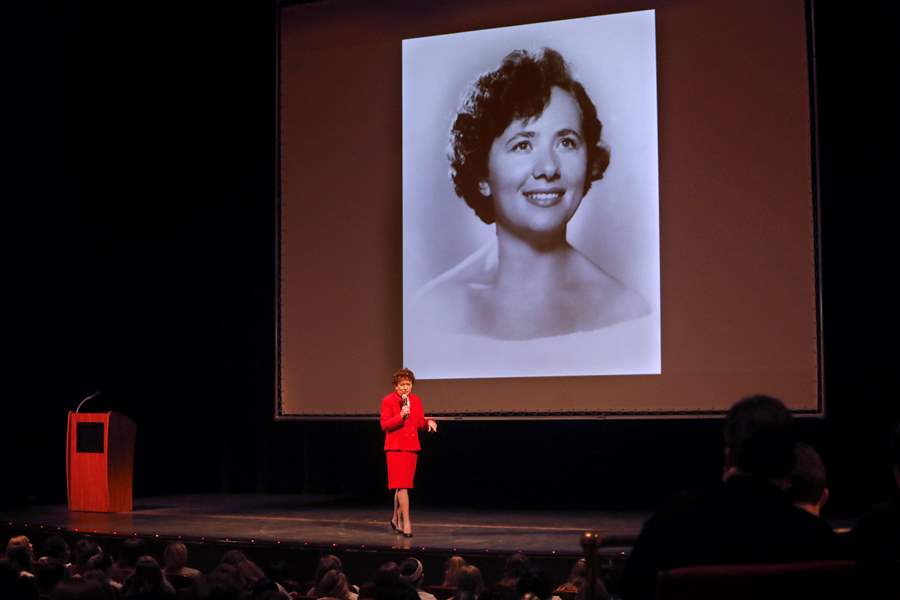
Holocaust survivor shares story with area students in 14th annual diversity program
2/27/2018
Irene Miller, 86, shares her story of surviving during the Holocaust with a crowd of several hundred students Tuesday, February 27, 2018, at the Valentine Theatre in downtown Toledo. Mrs. Miller was born in a Jewish family in Warsaw, Poland. Her parents were able to flee the country with Mrs. Miller and her sister to Soviet Russia, where they were sent to labor camps in Siberia. Mrs. Miller spoke about being a child in Siberia, as well as the years she spent in the Ukraine before the war ended. She returned to Poland as a young woman, pictured, to discover her entire extended family of more than 100 people had all been killed. Eventually, Mrs. Miller emigrated first to Israel and then the United States. She currently lives in Metro Detroit. Mrs. Miller said she felt it was important to discuss her experiences to keep alive the memory of those who were lost in Holocaust and to fight against a reoccurrence of other genocides. THE BLADE/KATIE RAUSCH
The Blade/Katie Rausch
Buy This Image
Irene Miller held the rapt attention of her young audience from the minute she walked onstage.
“I come to you as one of the 10 percent of children who survived the Holocaust,” Ms. Miller, 86, announced by way of introduction to the roughly 800 area middle, junior and high school students inside the Valentine Theatre on Tuesday.
“Of course, I can tell you only about my survival journey,” she continued. “But those of us fortunate to be left alive need to also become the voices of the children who did not live to tell their stories.”
WATCH: Irene Miller talks about surviving the Holocaust
Ms. Miller, who lives in the Detroit area, shared her story of struggle and survival during the 14th annual diversity program, presented to area students by the Ruth Fajerman Markowicz Holocaust Resource Center of the Jewish Federation of Greater Toledo.
She told the students how for years she chose not to talk about the fear, pain and constant hunger she endured as child during the Holocaust, even with her own children. She began to share her experiences more widely in 2012 when she published a memoir, Into No Man’s Land, and today regularly travels to speak at schools, churches, memorial centers, and other venues.
She said she’s come to see these engagements as among the most important work.
“You young people are the future leaders of this country,” she told he students. “It is important not just that you know what happened, but that you know how it happened, because it will be your responsibility to make sure that you do everything possible to prevent such a thing from happening again.”
Ms. Miller began her account in 1939 when she was a 5-year-old living with her parents and an older sister in Poland. She described to the students the frightening bombings that would send the family running to shelters and her parents’ decision that winter to hire a smuggler to take the family across a closed border into the Soviet Union.
The Nazis had not yet reached the Soviet Union by that winter.
The smuggler, however, left the vulnerable family in the no-man’s land between the two countries, a freezing field where they and hundreds of others huddled between blankets for weeks.
Ms. Miller recalled her mother urging her to “move, move, move” as a way to keep warm during those weeks, a tactic that ultimately did not save her from developing painful frostbite on her feet. The only food available was sold at a steep markup by peasant women who also supplied shovels to bury the dying refugees.
Ms. Miller escaped no-man’s land when her father bribed an official to let himself and his daughters enter the Soviet Union. Her mother later joined the family there.
Shortly afterward soldiers shipped the family to a labor camp in Siberia and then to a village in Uzbekistan, where Ms. Miller described overwhelming hunger; in her family’s 2½ years in Siberia, she said, she recalled just one day when she was allowed to eat her fill of potatoes; in Uzbekistan, she said, her mother would boil grass and leaves into a desperate soup.
In Uzbekistan, her parents sent her and her sister to an orphanage in the hopes that they would be fed better. Ms. Miller remained in the orphanage through the end of the war.
Her post-war years included a move to Israel and then to the United States, where she enrolled in bachelor’s and master’s programs in Cincinnati. Today she is retired as a health-care administrator and volunteers as a court mediator, a docent at the Detroit Institute of Arts, and on the board of directors for the American Jewish Committee.
In addition to Ms. Miller’s memoir, her experiences are featured in a PBS documentary, Irene: Child of the Holocaust, that premiered in December, 2016.
Hindea Markowicz coordinated the event as director of the Ruth Fajerman Markowicz Holocaust Resource Center. She said it’s important for students to hear first-hand accounts so that they learn and apply the lessons of the Holocaust.
“These students, as future citizens, need to be aware of the tragic result of the international and personal apathy in the face of oppression and discrimination,” she said.
Contact Nicki Gorny at ngorny@theblade.com or 419-724-6133.